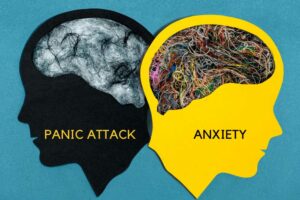It’s completely natural to struggle with guilt and shame as you recover from an alcohol or substance abuse addiction. When you’re dependent on a substance, you do things that you would never think of doing sober. The first step towards overcoming any guilt surrounding your actions is to recognize that it is a normal part of the recovery journey.
Guilt and shame are two different emotions, and more often than not, excess guilt can lead to shame. It’s important not to internalize your guilt so that it doesn’t turn into shame. There are several different tactics for dealing with (and moving on from) guilt in recovery. Let’s take a look at some of the most helpful solutions.
Understand that Feelings of Guilt are Counter-Productive to Your Recovery
It should come as no surprise that guilt is a negative emotion, and negative emotions work against your ultimate recovery. When you gave up using, you made a choice to do something healthy and positive for yourself. Dwelling on things that you did in the past and feeling guilty over them will only impede the process!
Be kind to yourself. You likely feel guilty because you’re being overly critical of the things you did when you were physically dependent on a substance. While it’s important to recognize wrongdoings, it’s even more important to accept them as a thing of the past and move on.
Asking for Forgiveness is Key
Keeping your feelings of guilt bottled up will only hurt you. If you’re feeling up to it, reach out to people you have hurt and ask them to forgive you. You’ll probably get a mixed bag of reactions, so be prepared for those who don’t want any contact with you. They may need a little bit of time to process the things you did when you were using.
You also need to forgive yourself. This is perhaps the most important part of overcoming guilt in recovery. Congratulate yourself for taking the necessary steps to get clean. It’s not easy, and most folks in the same position struggle to do so.
What’s more, something magical happens when you decide to forgive yourself. You may notice that other people come around to forgiving you more quickly when they see all of the hard work you’re putting into recovery.
Don’t Underestimate the Value of Therapy
Talking through your feelings of guilt with a trained professional can go a long way. If you have loved ones in your life who are there for you and who offer a kind ear, that’s great. But, there’s something to be said about speaking about your recovery with a licensed therapist.
There are so many options out there:
- Outpatient treatment
- Group therapy
- Dialectical Behavioral Therapy (DBT)
- Cognitive Behavioral Therapy (CBT)
Don’t be afraid to try different types of therapy until you find the one that works best for you. Any of the choices listed above offer a safe space to talk through, deal with, and eventually overcome your feelings of guilt.
Learn to Let Go
At the end of the day, the only person who can let go of your feelings of guilt is you. A therapist, family member, or friend can be helpful. But, you control yourself, no one else. As much as we would all like the ability to time travel, we can’t. The past is said and done and there’s no going back to change it. That’s why it’s essential to learn to let go.
When you hold onto the things that you did when you were under the influence, no one wins. You need to let go of any mistakes you made, and if you must think about them, think about the lessons learned. You’ll feel a great weight lifted off of your shoulders once you accept that the past is the past.
Be Careful About the People You Surround Yourself With
It’s normal to feel fragile in the early stages of recovery. While it’s not healthy to avoid people who don’t make you feel good — let’s face it, everyone has folks like that in their lives — when you’re just getting started, it’s better to spend time with people who support you.
If there are people in your life who are determined to make you feel bad about the things that you did when you were using, distance yourself from them. You should be around others who are encouraging. You’re already grappling with so much, don’t make things harder on yourself by surrounding yourself with toxic people.
Look at Addiction as a Disease
Unfortunately, we live in a society that looks at addiction as a moral failing instead of a disease. No matter how you found yourself in the situation that you’re in, addiction is in fact a disease. When you become addicted to something, you’ll do anything in your power to continue to use. Even if that means hurting the people you love and doing things that cause you shame.
Recognizing that addiction is a disease is another form of forgiving yourself. People become dependent on substances due to a number of different circumstances and conditions. Remember this when you start feeling guilty.
Change the Way You Think About Yourself
A big part of overcoming and dealing with guilt in recovering is changing the way that you see yourself. If you feel guilty, you’re likely stuck on the fact that you may have caused harm to people you love while you were using. But, remember: the moment you decided to get clean, you stopped being that person.
Change the narrative in your mind and be proud of yourself for entering recovery. It’s not an easy feat! Again, when you forgive yourself and treat yourself with kindness, others will begin to do the same.
The longer you hold onto feelings of guilt, the harder your recovery will be. Do the inner work yourself as well as with a licensed professional and you’ll be well on your way to overcoming any feelings of guilt that are weighing you down. It does work!
There is great power and value in using group therapy to treat substance abuse and addiction. The shared human experience of a collective creates an opportunity to learn empathy and compassion for others. Your healing is magnified by the experiences and inspiration of listening and healing along with other human beings. At Promising Outlook, we focus on group therapy because we know that healing collectively is healing powerfully. We offer learning and therapy in a group environment in addition to your individual therapy plan because we know that not only can you benefit from others, but your experience is also important in the healing of others. Call us at 866.980.2869 today to learn more about collective and individual healing. Find your voice by listening to others. Share your experiences so others can learn from you. Empower your recovery with therapy that opens your heart and mind to help you become a better person.






